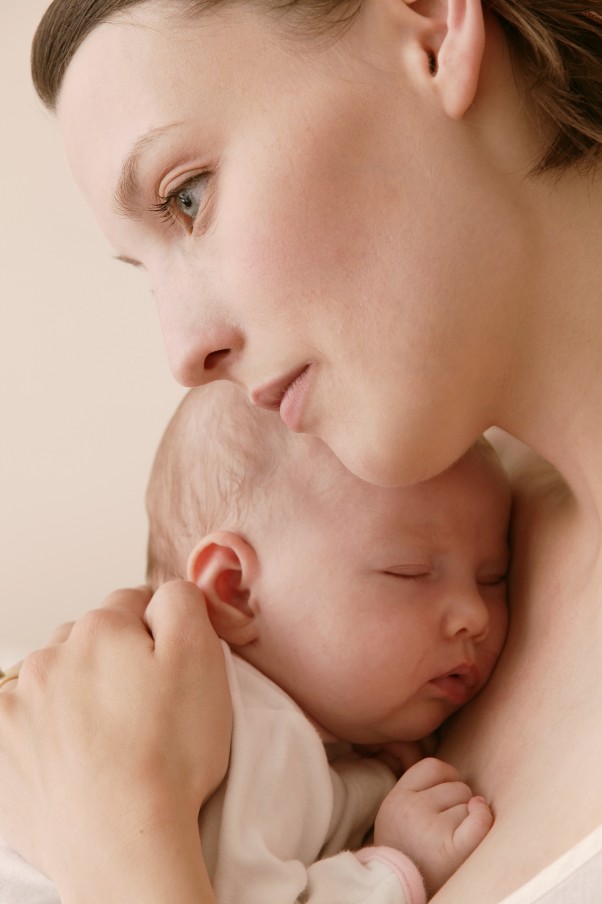|
|
| Pregnant Pause
January 26, 2016
I
ssue #55
|
|
Because there is no health without mental health!
|
THE BURDEN OF PERINATAL BIPOLAR DISORDER
|
|
Often confused with depressive disorders, bipolar disorder poses a challenging array of symptoms for pregnant women and new moms compared to women diagnosed with other mental illnesses. Of these difficulties, women with bipolar disorder are more likely to suffer from an overwhelming resurgence in clinical symptoms, particularly the onset of mania. Indeed, Dr. Cynthia Battle, an associate professor of psychiatry and human behavior at Brown University, believes that this population of women demonstrate the greatest needs in terms of clinical care and resources when compared to other perinatal groups.
Dr. Battle's research team found that new mothers diagnosed with bipolar disorder I or II had a significantly higher risk for self-harm and impairment--59% of
 participants had a history of attempted suicide. Additionally, approximately half of these new mothers had a history of substance use.
Women diagnosed with bipolar disorder I or II also are more likely to experience complications during labor and delivery when compared to women with other psychiatric conditions. Following delivery, 78% of women with a bipolar disorder reported having difficulty breastfeeding.
In the antenatal and postpartum period, when new moms are likely to experience sleep deprivation, mood episodes can be unexpectedly triggered. The "increased functional demands" can sometimes exacerbate symptoms.
Though women with bipolar disorder I or II experience difficult health outcomes in the antenatal and postpartum periods, limited data and information are currently available and screening for these disorders is notably difficult. In fact, healthcare providers are more likely to recognize the depressive symptoms of bipolar disorder and incorrectly diagnose a patient. When a previous history of bipolar disorder is not apparent, clinicians should work to rule out bipolar disorder when screening pregnant women and new mothers for mental illness. Correct diagnosis is critical to ensure these women are provided with appropriate resources that aid in effectively managing the challenges of their illness.
|
|
|
HOW TO TREAT BIPOLAR DISORDERS DURING PREGNANCY
Researchers estimate that 60-70% of women with bipolar disorder will experience a "mood episode" during their pregnancy or following delivery in the postpartum period. Further, choosing to postpone medication like lithium during pregnancy increases the chance of experiencing serious bipolar disorder symptoms. However, the use of medication during pregnancy is complicated by possible risks for the baby while in-utero.
In general, healthcare providers encourage thorough discussions about how an individual can best treat bipolar disorder during pregnancy, with the goal of "adequate
 mood stabilization" most often through use of medications that have proven effective in the past. Women can also use non-pharmacological approaches to bolster their health--like sharing newborn care responsibilities with a partner or loved one. Care should be coordinated among relevant providers, including psychiatrists and OBGYNs. From this, women with bipolar disorder can have a better chance of a healthier, safer pregnancy.
In addition, researchers from Northwestern Medicine found that physiological changes during pregnancy decreased the efficacy of a medication commonly used to treat bipolar disorder, Lamictal. When a woman becomes pregnant, she and her doctor should work to determine any adjustments in treatment that should be made to compensate for any antenatal biological changes. More research is also needed to determine effective psychiatric dosages during pregnancy.
|
|
DID YOU KNOW?

A number of maternal health factors function as risk factors for postpartum depression:
A prospective longitudinal study conducted over thirteen years identified a number of risk factors associated with postpartum depression. From the data, the strongest positive associations were found for antenatal depression and postnatal anxiety, with other positive associations found for a history of depression, a difficult delivery, and breastfeeding for less than six months.
To read more, click here .
Mindfulness training was found to be helpful in pregnant women: A study on pregnant women with a history of depression found that less than one in five who took sessions in meditation and yoga noted experiencing symptoms of depression. Researchers claim that these training sessions could be employed as a non-pharmacological tool to treat symptoms during pregnancy. To learn more, follow this link .
A new online tool will attempt to help veteran mothers suffering from postpartum depression: MomMoodBooster, an online tool developed at the University of Iowa, will be used to help mothers in rural areas cope with symptoms of depression. The project will, in particular, address postpartum depression in rural veteran moms. Of the 40 women that have already participated in MomMoodBooster, there have been positive results.
To learn more, click here.
|
|
Thank you to Kaiser Permanente and the Atlanta Women's Foundation for their generous support of the work of Project Healthy Moms.
|
 LOOKING FOR WAYS TO GET INVOLVED?
2) Check out our Facebook page 3) Sign up for our newsletters 4) Contact us to see if there are any current volunteer opportunities at: [email protected] |
SCREENING & IDENTIFICATION TRAINING FOR PERINATAL MOOD AND ANXIETY DISORDERS  Project Healthy Moms' PMAD Screening and Identification Trainings are aimed at healthcare providers (e.g. physicians, nurses, social workers) who come in contact with childbearing women. Through this program, healthcare providers who are involved in maternal and child health are trained to recognize symptoms of the various PMADs and consequences of untreated PMADs. During the training, providers learn how to screen mothers for PMADs and are also educated about treatment options and referral methods. The goal of the training is to ensure that healthcare providers are able to correctly and routinely identify and refer women who may be suffering from PMADs in their practices. Project Healthy Moms' PMAD Screening and Identification Trainings are aimed at healthcare providers (e.g. physicians, nurses, social workers) who come in contact with childbearing women. Through this program, healthcare providers who are involved in maternal and child health are trained to recognize symptoms of the various PMADs and consequences of untreated PMADs. During the training, providers learn how to screen mothers for PMADs and are also educated about treatment options and referral methods. The goal of the training is to ensure that healthcare providers are able to correctly and routinely identify and refer women who may be suffering from PMADs in their practices. To learn more and schedule a training, please contact Sarah Yoss at [email protected] or (678) 904-1968.
|
RESOURCE LIST
Did you know that Mental Health America of Georgia has a resource list for pregnant and postpartum women? It is updated regularly and provides contact information for healthcare providers and outlets for self-care for pregnant and postpartum women.
To access the list, visit www.mhageorgia.org/project-healthy-moms/resource-list/
|
|
PROJECT HEALTHY MOMS WARMLINE AVAILABLE TO ALL GEORGIA WOMEN
 The Project Healthy Moms Warmline is available for ALL Georgia women seeking peer support and resource linkage for perinatal mood and anxiety disorders! Georgia women can call or email the Project Healthy Moms Warmline to contact a mother who has experienced and overcome a maternal mental illness and can provide emotional support and suggest appropriate resources. Please leave a message when you call the Warmline, and a support person will respond within 24-48 hours. It does get better! The Project Healthy Moms Warmline is available for ALL Georgia women seeking peer support and resource linkage for perinatal mood and anxiety disorders! Georgia women can call or email the Project Healthy Moms Warmline to contact a mother who has experienced and overcome a maternal mental illness and can provide emotional support and suggest appropriate resources. Please leave a message when you call the Warmline, and a support person will respond within 24-48 hours. It does get better!
678-904-1966 Email: [email protected] |
| WE NEED YOUR SUPPORT!
Project Healthy Moms is an important initiative of MHA of Georgia. Perinatal mood disorders are the most common complication of childbirth. In the United States, approximately 20% of new mothers suffer from these devastating illnesses which, if not properly treated, can have a long-term negative impact on the health of not only the mothers, but their children and families as well. Our goal is to increase awareness, identification, treatment, and support of perinatal mood disorders in Georgia, while also reducing the stigma associated with them.
To learn more about Project Healthy Moms, click here.
Project Healthy Moms is only one of many programs developed by MHA of Georgia to further our mission of enhancing the mental health of all Georgians through education, outreach, and advocacy.
Click here to learn more about MHA of Georgia's other programs. Your support will help us continue our work educating Georgians about mental illness, striving to eliminate stigma, and advocating on behalf of people with mental illness in our state. Click here to support MHA of Georgia.
|
|
| |
| |
|